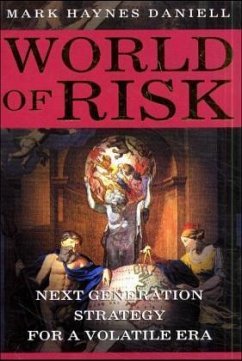We are all now living in a world of accelerating but unmanaged global risk. This book provides a fresh and creative look at risk and its impact on some of the most critical challenges of our time. It outlines a new state-of-the-art model of global strategy and leadership and applies it to provide improved solutions to the rising set of risks inherent in economic crises, crime, disease, the environment, the poverty gap, the unpoliced cyberworld and the erosion of our traditional systems of culture, value and belief. Unlike prior analyses that only highlight problems, World of Risk presents an architecture of practical solutions that can truly make this a better world for the next generation. Mark Daniell has written a thought-provoking masterpiece with perfect timing on the eve of the millennium. He covers multiple issues of potential danger in the world we live in and sets a strategy for dealing with them. He writes with great clarity and insight on every subject including the commitment of the individual and the collective global responsibility of our leaders and institutions in combating the horrendous risks around us in what he calls a 'dangerous cocktail.'Ausgehend von der Finanzkrise in Asien 1997 und den damit verbundenen globalen Risiken, hat Daniell einen allgemeinen praxisorientierten Ansatz entwickelt, mit dessen Hilfe globale Initiativen und Risiken besser gemanagt werden können. Behandelt werden die wichtigsten globalen Fragen zu Risiko, Umwelt, internationaler Finanz- und Cyberwelt. "World of Risk" betrachtet eine Reihe international bewährter Managementstrukturen und Betriebsgrundsätze in multinationalen Unternehmen und analysiert, wie diese isoliert werden können, um sie auf nicht erwerbswirtschaftliche Probleme anzuwenden. Ziel ist es, eine signifikante Verbesserung im Umgang mit globalen Initiativen und Risiken zu erreichen. Da eine wirkungsvolle, zentrale Verwaltungsorganisation nicht existiert, stellt Mark Daniell die These auf, daß nur ein vernetzter/interdependenter Ansatz dazu beitragen kann, die Entwicklung von Krisensituationen mit weit größerem Ausmaß als in Asien zu verhindern.

